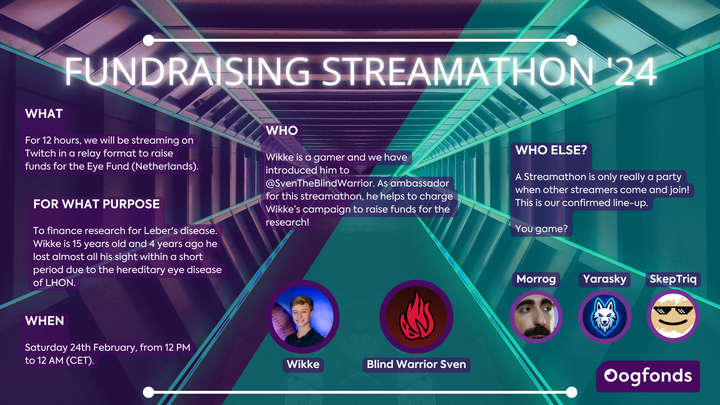
Fundraising Streamathon against LHON 2024
Donation protected
Eye Fund - Fundraising Streamathon '24
WHAT
For 12 hours, we will be streaming on Twitch in a relay format to raise funds for the Eye Fund.
FOR WHAT PURPOSE
To finance research for Leber's disease. Wikke is 15 years old and 4 years ago he lost almost all his sight within a short period due to the hereditary eye disease of Leber.
WHEN
Saturday 24th February, from 12 PM to 12 AM (CET).
WHO
Wikke is a gamer and we have introduced him to @SvenTheBlindWarrior. As ambassador for this streamathon, he helps to charge Wikke’s campaign to raise funds for the research!
The Mission
Can you envision a world illuminated by breakthroughs in medical science, where the encroaching shadows of hereditary blindness are vanquished? For Wikke, a valiant 15-year-old warrior who has nearly lost all his vision to the stealthy Leber’s disease, this vision is a battle cry.
Wikke is not standing alone.
In solidarity, the Eye Foundation Netherlands is igniting a beacon of hope and innovation. The stage is set: a cadre of diligent researchers awaits, their expertise poised to chase down the dream that Wikke envisions. But their quest for a cure is at a standstill without your support. Will you join us in this crucial fight?
Consider this: across our planet, 2.5 million individuals are enveloped in the darkness of hereditary eye diseases. Within this expanse, Leber’s disease lurks, an elusive predator robbing people of their sight.
Emerging Techniques
"There is currently no cure," states Dr. Jan Wijnholds, a biochemist at the Leiden University Medical Center specializing in the fight against hereditary eye diseases. "But we are at the cusp of a revolution, thanks to the rapid pace of scientific advancement. Techniques once relegated to the realm of science fiction are now within our grasp, offering a glimmer of hope."
Dr. Wijnholds is referencing stem cell technology and CRISPR-Cas (detailed below). Stem cells can be utilized to cultivate mini human retinas, inclusive of optic nerves, in laboratories. With CRISPR-Cas, erroneous DNA segments can be replaced, provided the faulty DNA segment is identified. Three such mutations related to Leber's disease have been detected. A majority of patients possess one of these three mutations.
Dr. Wijnholds elucidates, "By merging cultured optic nerves with CRISPR-Cas, we aim to understand the DNA errors leading to the death of optic nerve cells—a phenomenon still shrouded in mystery. This knowledge can help us rectify these errors safely, representing a pivotal stride towards countering blindness via gene therapy."
Cultivating Optic Nerves Using Stem Cells
In partnership with the Rotterdam Eye Hospital, Dr. Wijnholds and his crew will develop cultured organoid disease models. To grow miniature retinas characteristic of Leber's disease, patients with the condition donate skin cells. Since the DNA mutation is pervasive in all cells of the body, these skin cells contain it.
In a culture dish, the skin cells are converted into stem cells — primitive cells with the potential to evolve into any bodily cell. These stem cells are then induced to differentiate into retinal cells, leading to the growth of mini retinas, replete with components like optic nerves.
CRISPR-Cas: DNA Editing Technique
The CRISPR-Cas method involves excising a specific DNA fragment and substituting it with the correct sequence. This innovative technique leverages the cell's intrinsic transport mechanism. The blueprint for the DNA-editing protein infiltrates the cell, hitching a ride on a certain lipid vesicle. Inside the cell, transport proteins identify this vesicle, shuttling it to the appropriate cellular location.
Here, the protein gets synthesized and executes its function. The specific lipid vesicle selected by Dr. Wijnholds dictates its cellular destination: either the cell nucleus or the mitochondria.
Mitochondrial Challenges
While gene therapy is the beacon of hope, challenges lie ahead for Dr. Wijnholds. Certainly, CRISPR-Cas can meticulously modify standard nuclear DNA. However, the mutations associated with Leber's disease aren't in this nuclear DNA but in the mitochondrial DNA.
Mitochondria are cellular powerhouses responsible for energy provision, energy regulation, and orchestrating the demise of aged cells. Due to these pivotal roles, mitochondria maintain their distinct DNA.
Dr. Wijnholds observes, "Prior studies affirm that CRISPR-Cas can amend mitochondrial DNA. Pioneering in the Netherlands, we are attempting this on optic nerves—an exhilarating endeavor."
A Bright Future
Should Dr. Wijnholds' research outcomes be positive, clinical trials could commence within approximately seven years, in collaboration with the Rotterdam Eye Hospital. These trials would focus on translating the DNA rectification method into a safe, human-applicable procedure.
Dr. Wijnholds is optimistic, stating, "Having been in the scientific realm for a considerable period, I regard these techniques as exceptionally promising. I'm convinced that, in due course, we'll unearth a strategy to ward off blindness induced by Leber's disease. Our responsibility is to give it our best shot for the patient community."
A Broader Impact
The research spearheaded by LUMC isn't solely pertinent to those grappling with Leber's disease. Numerous grave genetic ailments arise from mitochondrial DNA errors. Success in rectifying mutations related to Leber's disease might unlock therapeutic avenues for these other disorders.
"However, backers and pharmaceutical firms will only support gene therapy's development if a proof of concept exists," Dr. Wijnholds clarifies. "Hence, the immediate need for funding."
Support & Contribute to the Research!
Without adequate funding, research remains stalled. The Eye Fund is fervently striving to garner sufficient financial resources and implores everyone to contribute. Stand with us: donate and catalyze Dr. Wijnholds' pivotal research on Leber's disease, aiming to preclude and treat hereditary blindness in the forthcoming years.
From Wikke: A heartfelt thank you.
________________________________________
Eye Foundation Netherlands (Oogfonds)
The Eye Foundation is the premier private benefactor of ophthalmological research in the Netherlands. They bankroll scientific inquiries into the diagnosis, prevention, and remediation of ocular disorders. Additionally, they disseminate information regarding eye diseases, championing optimal ocular health.
Notably, the Eye Foundation operates sans government grants, relying solely on generous donations.
Organizer
Eye Foundation Netherlands
Organizer
Utrecht